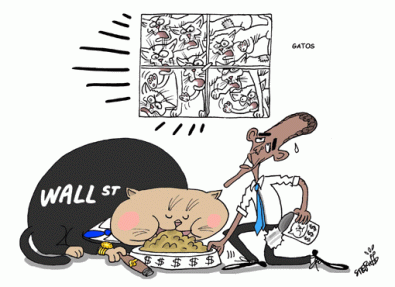
† [The Telegraph, U.K.]
Le Monde, France
France Must Relearn Lessons of Roosevelt's New Deal Tax Policies
"With the New Deal, Roosevelt laid the foundation of the modern welfare state in a country where the culture of social protections was totally foreign. ... On the eve of his arrival at the White House, the marginal tax rate on higher incomes was never more than 25 percent. He raised rates to 63 percent and in 1941, 91 percent. ... This dissuasive taxation on very high incomes would lead to a strong reduction in inequality."
By Pierre-Alain Muet
†††††††††††††††††††††††††††††††††††† 
Translated By L. McKenzie
Zeiss
March 10, 2009
France
- Le Monde - Original Article (French)
Just like the crisis of 1929,
the current crisis has two faces. The exposed face is of course the financial
crisis. Demands for profitability incompatible with the real economy that were
maintained by a proliferation of financial innovations, have collapsed like a house of
cards now that market expectations have turned sour.
But the crisis has another
face: the constant pressure on wages resulting from the demand for
profitability has profoundly increased the gap between income from wages
and income from capital. The American economy continued to grow in the 2000s
even as median wages stagnated, with demand fueled by the debt of the most
modest households. To a lesser degree, this situation was also found in the
European countries, including France. As it was on the eve of the 1929 crisis, liberal
globalization has led to a formidable accumulation of wealth in a small
minority of the population.
If, in contrast to the crisis
of 1929, governments have succeeded in temporarily extinguishing the flames and
averting financial bankruptcy with a massive injection of public funds, they
haven't grasped the dimension of the profound global regulatory changes
that must be introduced to properly respond to what is the first great crisis
of liberal globalization.
After the crisis of 1929,
Roosevelt took radical measures, in 1933 separating commercial [savings banks]
from investment banks [the 1933 Glass-Steagall Act] and with great conviction, introduced the strict
regulation of investment banks: banks that held deposits were regarded as
institutuions undertaking a kind of public service. They were not permitted to risks their
deposits by speculating on financial markets. They were therefore subject to
strict regulation and in return, the state guaranteed that they wouldn't fall
into bankruptcy.

[Hoje Macau, Macau]
With the New Deal, Roosevelt
laid the foundation of the modern welfare state in a country where the culture
of social protections was totally foreign. Europe's widespread adoption of
these public policies coupled with the development of the welfare state and a
highly regulated financial economy contributed to the long period of postwar
prosperity, when the Bretton
Woods system prevailed.
[Editor's Note: Bretton Woods
set up a system of rules, institutions, and procedures to regulate the
international monetary system after World War II. It established rules for
commercial and financial relations among the world's major industrial states].
But there was another domain
in which Roosevelt profoundly and lastingly overturned the rules: inequality.
On the eve of his arrival at the White House, the marginal tax rate on higher
incomes was never more than 25 percent. He raised rates to 63 percent and in
1941, 91 percent. For half a century, the United States lived with a marginal
tax rate on very high incomes of nearly 80 percent. This dissuasive taxation on
very high incomes would lead to a strong reduction in inequality before taxes
(and, even more so, after); it was a situation that one would find in nearly
all industrialized countries during the post-war period.†
Posted by WORLDMEETS.US
The stagnation in wages has
no economic justification. On the contrary, it contributes to the loss of
confidence in the economic system. Who can believe that the work of an employee
whose average salary is 1.6 times the minimum wage or a middle manager or owner
of a small or medium business whose average salary is three times the minimum
wage, has 100 or 200 times less value than the work of a CAC 40
[France's equivalent to the DOW] CEO
who, by accumulating stock options and bonuses, brings home more than 300 times
the minimum wage per year! In the period of the "glorious thirties"
[the three decades of sustainable growth that followed Bretton Woods], when the
heads of large businesses and banks worried primarily about their performance
as bosses, the pay differentials were ten times smaller - and the economy was
doing just fine!
In these three areas -
regulation, public policy and inequality - economic efficiency is a long way
from the liberal credo that has driven the global economy into the wall. This
helps one understand the difficulties that President Sarkozy faces in
responding efficiently to the crisis. The values on which he campaigned and
which are reflected in his tax package of 2007, the last misadventure of
"trickle-down economics," are the antithesis of the policies that
he should be promoting today. Forced by the magnitude of the crisis to emulate
policies he banished from his vocabulary, he is as ill-equipped to implement a
true policy of revival as he is to contributing to the necessary reform of the
global economy.†††
Posted by WORLDMEETS.US
America has turned the page
on George Bush and opened another era with the first measures of Barack Obama.
Mired in an outdated ideology, the France of Nicolas Sarkozy is likely to be
out of the game for a long time to come.
*Pierre-Alain
Muet is a Socialist Party MP and a former
president-delegate of the Counsel of Economic Analysis
CLICK HERE FOR FRENCH
VERSION
[Posted by WORLDMEETS.US March 19, 1:27pm]